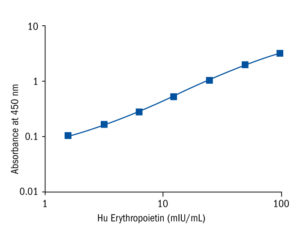Erythropoietin Human ELISA
Erythropoietin (EPO) is a hormone produced by the kidney that promotes the formation of red blood cells in the bone marrow. EPO is a glycoprotein with a molecular weight of 34 kDa. The kidney cells that primarily make EPO are specialized and sensitive to low oxygen levels in the blood. These cells release EPO when the oxygen level is low in the kidney. EPO binds the Epo receptor (Epo R) on erythroid progenitors in bone marrow eliciting proliferation, maturation, and differentiation of red blood cells thereby increase the oxygen-carrying capacity of the blood. EPO is the prime physiological regulator of red blood cell production. The measurement of EPO in the blood is useful in the study of bone marrow disorders and kidney disease. Elevated levels of EPO can be seen in polycythemia, a disorder in which there is an excess of red blood cells. Lower than normal levels of EPO are seen in chronic renal failure. EPO plays an important role in the brain’s response to neuronal injury. EPO is also involved in the wound healing process. Measurement of serum immunoreactive erythropoietin has shown that overproduction of EPO can be an adaptive response to conditions producing tissue hypoxia, such as smoking chronic obstructive pulmonary disease, renal hypoxia or cyanotic heart disease. Elevated serum levels have further been found in patients suffering from various neoplastic diseases, such as renal carcinomas and benign renal tumors, liver carcinomas and hepatomas, cerebellar hemangioblastomas and other neoplastic disorders. Serum levels of EPO lower than normal are found in various forms of anemias. In case EPO is not primarily involved in the cause of the anemia, elevated levels of EPO are found in serum of the patients suffering from diseases like aplastic anemias, iron deficiency, megaloblastic anemias, thalassemias and myelodysplastic syndromes.
Research topic
Bone and cartilage metabolism, Renal disease
Type
Sandwich ELISA, Biotin-labelled antibody
Applications
Serum, Plasma-EDTA, Plasma-Heparin, Plasma-Citrate, Cell culture supernatant
Sample Requirements
50 ul/well
Storage/Expiration
Store the complete kit at 2–8°C. Under these conditions, the kit is stable until the expiration date (see label on the box).
Calibration Curve

Calibration Range
1.6–100 mIU/mL
Limit of Detection
0.17 mIU/mL
Intra-assay (Within-Run)
CV = 3.4%
Inter-assay (Run-to-Run)
CV = 6.2%
Dilutation Linearity
105,20%
– Miettinen J, Tainio J, Jahnukainen T, Pakarinen M, Lauronen J, Jalanko H. Anemia and low-grade inflammation in pediatric kidney transplant recipients. Pediatr Nephrol. 2016 Aug 30;

